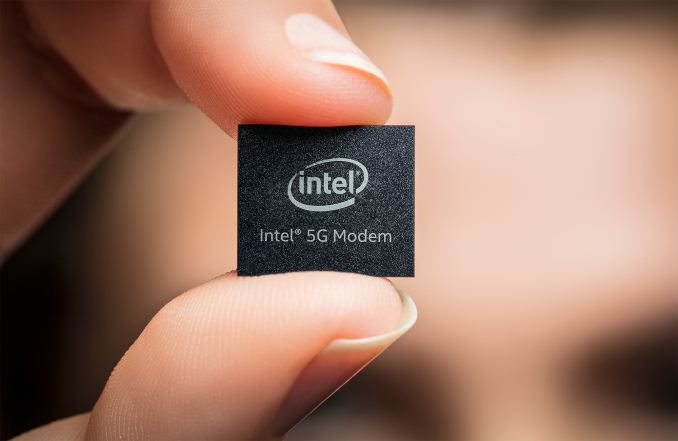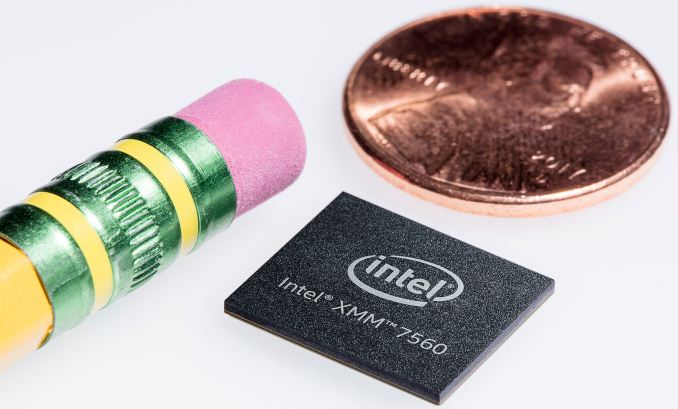Intel Announces XMM 8060 5G & XMM 7660 Category 19 LTE Modems, Both Due in 2019
by Anton Shilov on November 20, 2017 10:00 AM EST
Intel last week announced that its first commercial 5G modem, the XMM 8060, is now under development and will ship in a couple of years. As part of the announcement, the company reiterated its plans to offer a top-to-bottom XMM 8000 family of 5G modems for various applications, including smartphones, PCs, buildings and vehicles. In addition, the company announced its XMM 7660 Cat-19 LTE modem that supports download speeds of up to 1.6 Gbps, which will be available in 2019.
At present, Intel’s 5G Mobile Trial Platform is used to test 5G technologies in different locations around the world. For example, one of such devices installed aboard the Tallink Silja Europa cruise ship is used to enable Internet connectivity to passengers while in port in Tallinn, Estonia, (where another 5G MTP is installed) and the nearby area. Meanwhile, Intel’s 5G Modem for client applications is evolving as well. Intel said that devices powered by the silicon can now make calls over the 28 GHz band. The 5G MTP will be used for its purposes for a while and will even gain new capabilities over time, but the company is working on a family of commercial modems that will be used for mass applications sometimes in 2019 and onwards. The Intel XMM 8000-series multi-mode modems will operate in both sub-6 GHz and millimeter wave global spectrum bands, combining support for existing and next-gen radios. Intel does detail the whole lineup two years before the launch but indicates that it will be able to address smartphones, PCs, vehicles, and fixed wireless consumer premise equipment (CPE).
One of the first members of the Intel XMM 8000 family will be the XMM 8060 modem. This unit will support full 5G non-standalone and standalone NR, as well as 2G, 3G/CDMA, and 4G modes, thus enabling devices to work in different locations, including large cities with 5G standalone NR (this may be a distant future) as well as rural areas that have 2G or 3G networks. Intel expects commercial devices based on the XMM 8060 to ship in mid-2019, a little bit ahead of 5G networks deployment in 2020.
Since 5G is not going to become widespread for a number of years to come, there will be demand for Gigabit speeds over LTE from various parties in 2018 - 2020. Intel announced its first-gen Cat 16 Gigabit LTE modem — the XMM 7560 — earlier this year and at present the chip is being tested by smartphone makers. A good news is that it now can officially achieve Gigabit-class speeds (presumably in an actual device), so expect commercial products on its base sometimes next year. In the meantime, Intel is prepping the XMM 7660, its second-generation Gigabit LTE modem capable of up to Cat 19 (1.6 Gbps) downlink connections. Intel hasn't disclosed much in the way of details on this one, but expect a natural set of features here — advanced MIMO, carrier aggregation, 256QAM, loads of bands support, etc. Intel expects commercial devices to adopt the XMM 7660 in 2019. By that time, leading carriers will implement many of the features necessary for both 5G and Gigabit LTE, so the modem will be able to achieve its speeds in many locations.
Related Reading:
- Qualcomm Announces New X50 5G Modem, First Gigabit Class LTE Network and Router
- Qualcomm Announces Snapdragon X20 LTE Modem & New RF Front-End Modules For Mobile Devices
- Netgear Nighthawk M1: LTE Cat 16 Router up to 1 Gbps
- MWC 2017: Netgear Nighthawk M1 Coming to Europe in Mid-2017, But
- MediaTek Unveils Helio P23 & Helio P30 SoCs: Premium Midrange for Q4'17 & Beyond
- TechInsights Confirms Apple’s A10X SoC Is TSMC 10nm FF; 96.4mm2 Die Size
- Qualcomm Announces 205 Mobile Platform: Entry-Level LTE for India & Emerging Markets
Source: Intel












41 Comments
View All Comments
PeachNCream - Monday, November 20, 2017 - link
Data caps make it hard to get excited about faster cellular modems. :(SydneyBlue120d - Monday, November 20, 2017 - link
In fact, you should:https://semiaccurate.com/2017/11/14/qualcomm-shows...
PeachNCream - Monday, November 20, 2017 - link
The stuff in that article doesn't address carrier-imposed data caps. As a cellular user, I just don't really care about the network that moves my data around unless its broken or is working poorly. Preventing it from being broken is the network provider's problem. It's the provider's problem to efficiently use available frequencies or whatever else. If new technology doesn't change my data cap, then going faster means nothing to me but that I can hit that cap a little more quickly. I still have to sit around fretting about how much data of my plan that I use regardless of how much faster it gets so nope, I have nothing to get excited about.jospoortvliet - Wednesday, November 22, 2017 - link
Ivan currently visiting India and amazed at the data caps on 4g here. 10gb a day for a few dollars per month, I kid you not. Coming from Germany with my 40 bucks for 3gb/month I suddenly feel in the 21st century.I blame the oligopoly of 4-5 providers at most which have bought up all small ones consolidating their power. We need 30's style anti-monopoly enforcement back if you ask me, the deregulation and small government craze started in the 70's has given us enough crisis, corruption and monopolies.
ads295 - Monday, November 20, 2017 - link
Being in India and just getting a taste of LTE, I cannot help but wonder: is there even a point in getting to 5G speeds beyond vague definitions of "progress" as a numbers game? Is it really as simple as "the company would have nothing to do otherwise"?I mean, even with the kind of user density we have here, LTE is mighty quick...
mkozakewich - Monday, November 20, 2017 - link
The main goal of 5G is to make high-capacity mesh networks, from what I'd read previously. In the near future, you might be able to access certain local resources at high speed, almost like you're on a LAN. In those cases, gigabit speed would be good.Cliff34 - Monday, November 20, 2017 - link
Problem is not speed but data cap. Having 5G is meaningless unless telecomm allows you to have data cap like 200 gb or else you will used up all your data or pay a hefty fee.saratoga4 - Monday, November 20, 2017 - link
Data caps exist because the bandwidth available over lte frequencies is limited. 5G aims to alleviate bandwidth limitations by adding higher frequencies and more efficiently using existing ones.So no, having 5G is not meaningless. It will be very important as more and more services move onto cellular networks.
PeachNCream - Monday, November 20, 2017 - link
I'm kinda with Cliff on this. Even if 5G removes some of the limitations telcos are running into, it doesn't mean they're going to pass their customers more data for the same price. They have to pay to upgrade their networks and expand to deal with more people/devices on those networks. Plus businesses have to show growth or their shareholders aren't happy. If 5G makes things more efficient, the very last thing that'd happen is giving customers more data or the same data for less cost. Like Cliff says, the data caps and not speed are the problem for customers right now.ads295 - Tuesday, November 21, 2017 - link
What sort of data caps do you guys have on LTE? I get to use 1GB per day of high speed LTE at INR400 for 75 days plan validity.